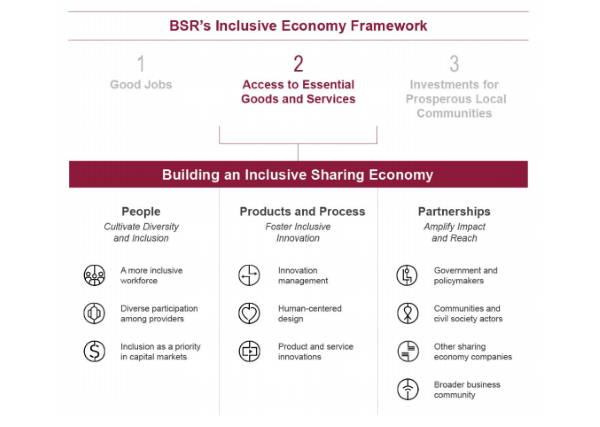This month, Business for Social Responsibility (BSR), a nonprofit membership organization that promotes social responsibility in business, released a report outlining how sharing economy companies can achieve, “a more meaningful uptake of collaborative marketplaces among lower-income and underserved populations.” The report recognizes the potential of the sharing economy to increase access to goods and services and help people earn and save money.
The crux of the report, however, is an exploration of the opportunities the sharing economy holds for underserved communities and recommendations for how to realize them. This is presented in context of growing recognition that the sharing economy doesn’t reach deeply enough into communities that could benefit most from it. The recommendations are packaged in a solutions-based framework focused on three key areas:
- People (cultivating diversity and inclusion)
- Products and process (fostering inclusive innovation)
- Partnerships (amplifying impact and reach)
The recommendations include diversifying the workforce of sharing economy companies, hiring more providers in low income communities, increasing diversity of startups and those who fund them, using product design and tweaking algorithms to support inclusion, partnering with civil society actors, and more.
The report covers a lot of ground and is a big step in the right direction. However, it is flawed in significant ways, perhaps fatally so.
For starters, much of the data used in the report is provided by a handful of for-profit sharing economy companies and paints too rosy a picture of their positive impact. For instance, the report uses Airbnb stats claiming a $312 million one-year economic impact in Los Angeles while glossing over the fact that Airbnb and other home-sharing enterprises contribute to the affordable housing crisis in cities — likely negatively impacting low-income people the most. One of the biggest ways Airbnb and their ilk can help low-income communities is to follow regulations limiting short-term rentals and work diligently to keep illegal hotels off of their platforms.
This brings us to the second major flaw — those consulted for the research were mostly the for-profit sharing economy companies themselves. There are too few academics, nonprofits, and representatives of low-income communities to offer a balanced perspective. For instance, Airbnb is mentioned 62 times in the report while nonprofits and academic institutions are mentioned sparingly. One of those academic institutions, Stanford Social Innovation Review (SSRI), has written some excellent articles on the sharing economy including, “Nonprofits Should Lead the Sharing Economy,” and “Creating a Sharing Economy that Actually Shares.” The second piece recommends that sharing economy platforms share ownership and governance with users.
Which brings me to a third failing. The report does not include any suggestions on how platforms could share ownership and governance with users, perhaps the best way to ensure that the benefits of the sharing economy are spread more broadly. There was also no mention of platform cooperatives (apps organized as cooperatives where users own and govern the business), perhaps the most important development toward fairness in the sharing economy. Before the report was published, I also e-mailed these ideas to one of the report’s authors who sought my input. Below is the e-mail I sent, word-for-word. Unfortunately, these ideas never made it into the report either, a big missed opportunity, which is what I’d conclude about the report given the seriousness of the issue and the tremendous influence of the stakeholders involved.
Hi ______,
I really appreciate the invite, but I must attend to other priorities.
I also have deep reservations about the underlying assumption of the event which I will share briefly as a way to participate, albeit virtually.
Basically, organizations that are not specifically chartered to have social or other positive impacts should not be expected or even trusted to do that job. This is especially true of venture capital backed for-profit corporations because of the overwhelming power of investors as stakeholders in this arrangement and their need for outsized returns. As I've seen time and again, everything including abiding laws and regulations not to mention basic ethical principles are thrown out the window in the monomaniacal pursuit of growth and an exit (IPO or sale) as fast as humanly possible.
The best way to ensure that an organization has social impact is to put that in the very DNA of the organization — the articles of incorporation, the bylaws, the mission, vision, and values and more. The entry level for social impact is B corporation status where managers of the corporation at least can't be sued for not doing everything possible to maximize shareholder returns. The maximum one can do for social responsibility is a multi-stakeholder cooperative chartered specifically for a social purpose where many stakeholder types (employees, customers, partners, etc.) are owner-members with ownership stakes and voting rights.
This is why I think don't think it's possible in the long term to create an inclusive sharing economy with the current supposed leaders of the sharing economy (Airbnb, Lyft, etc.) and why we have been writing about a new development — platform cooperatives, i.e. sharing economy companies where the users are owners and decision makers in the enterprise:
https://www.shareable.net/blog/11-platform-cooperatives-creating-a-real-sharing-economy
https://www.shareable.net/blog/owning-is-the-new-sharing
This is basically what I would have shared at the event. It's not exactly a new idea, yet I hope this is voiced in the forum. Please let me know if there's any other way I can be helpful.
Thank you, Neal









